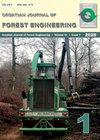远程树木密度计在林木胸径测量中的准确性评价
IF 2.1
2区 农林科学
Q1 FORESTRY
引用次数: 8
摘要
准确的树木直径测量是森林清查的重要组成部分。本研究评估了远程树木测量仪测量树木DBH的可靠性。我们将直接卡尺测量值(参考测量值)与从激光卡尺和智能手机在三种森林类型(松树、橡树和白杨林)内距离每棵树0.5米、1米和1.5米处收集的远程测量值进行了比较。一般来说,与直接卡尺测量相比,无论森林类型和距离如何,所有远程树木测量仪都低估了平均直径。我们观察到,在松林和橡树林内1.5米处,直接卡尺测量和智能手机测量的平均偏差最低(分别为0.3厘米和0.36厘米)。在不同的森林类型中,在0.5米的距离上,直接卡尺测量和智能手机测量之间的偏差明显大于其他类型。ANOVA检验用于确定在特定距离以及三种不同的森林类型之间,卡尺测量和远程测量之间是否存在显著偏差。我们拒绝了零假设,该假设表明,从直接卡尺测量获得的树木DBH测量值与在远处捕获的间接测量值(智能手机和激光卡尺)之间没有统计学上的显著差异(p<0.05)。然后,进行事后测试,以检查哪一组估计偏差与参考数据不同。结果表明,在某些森林类型(松树和橡树)中,使用智能手机应用程序在1米和1.5米处进行的树木DBH间接测量与直接树木DBH测量没有显著差异。此外,我们的测试结果大多表明,除了在所有森林类型中使用智能手机应用程序在0.5米处进行的测量外,每个森林内都没有显著差异。尽管森林特征和测量距离可能在远程树木DBH测量精度方面发挥着重要作用,但在测量树木DBH时,智能手机应用程序可以作为直接测量的实用替代方案,这可能是林业的一个积极发展,因为智能手机的使用越来越多,而且免费测量应用程序的可用性也越来越高。本文章由计算机程序翻译,如有差异,请以英文原文为准。
Evaluating the Accuracy of Remote Dendrometers in Tree Diameter Measurements at Breast Height
An accurate tree diameter (DBH) measurement is a significant component of forest inventory. This study assessed the reliability of remote dendrometers to measure tree DBH. We compared direct caliper measurements (reference measurements) to the remote measurements collected from a laser caliper and a smartphone at 0.5 m, 1 m, and 1.5 m distances from each tree within three forest types (pine, oak, and poplar forests). In general, all remote dendrometers underestimated the mean diameter compared to direct caliper measurements, regardless of forest types and distances. We observed that the mean deviation of direct caliper measurement and smartphone measurement at 1.5 m within a pine forest and oak forest were the lowest (0.3 cm and 0.36 cm, respectively). The deviations between direct caliper measurements and smartphone measurements at a 0.5 m distance, across forest types, were noticeably larger compared to others. An ANOVA test was used to determine whether significant deviations existed between caliper measurements and remote measurements at a specific distance, and among three different forest types. We rejected the null hypothesis, which suggested that there were no statistically significant differences (p<0.05) between tree DBH measurements obtained from the direct caliper measurements and indirect measurements (smartphone and laser caliper) captured at a distance. Then, a post-hoc test was performed to examine which set of estimated deviations was different from the reference data. The results suggested that indirect tree DBH measurements using the smartphone app at 1 m and 1.5 m in certain forest types (pine and oak) were not significantly different from direct tree DBH measurements. Also, our test results mostly indicated no significant difference within each forest, except for measurements using the smartphone app at 0.5 m across all forest types when the smartphone measurements were compared to laser caliper measurements. Although forest characteristics and measurement distance may play an important role in remote tree DBH measurement accuracy, the smartphone app may be used as a practical alternative to direct measurement in measuring the DBH of a tree, which may be a positive development for forestry due to the increased use of smartphones and the availability of a free measure app.
求助全文
通过发布文献求助,成功后即可免费获取论文全文。
去求助
来源期刊
CiteScore
5.20
自引率
12.50%
发文量
23
审稿时长
>12 weeks
期刊介绍:
Croatian Journal of Forest Engineering (CROJFE) is a refereed journal distributed internationally, publishing original research articles concerning forest engineering, both theoretical and empirical. The journal covers all aspects of forest engineering research, ranging from basic to applied subjects. In addition to research articles, preliminary research notes and subject reviews are published.
Journal Subjects and Fields:
-Harvesting systems and technologies-
Forest biomass and carbon sequestration-
Forest road network planning, management and construction-
System organization and forest operations-
IT technologies and remote sensing-
Engineering in urban forestry-
Vehicle/machine design and evaluation-
Modelling and sustainable management-
Eco-efficient technologies in forestry-
Ergonomics and work safety

 求助内容:
求助内容: 应助结果提醒方式:
应助结果提醒方式:


